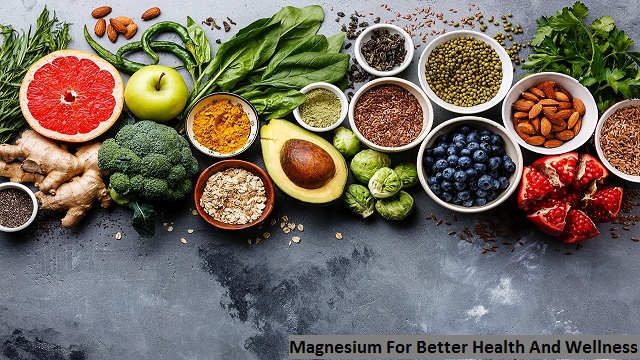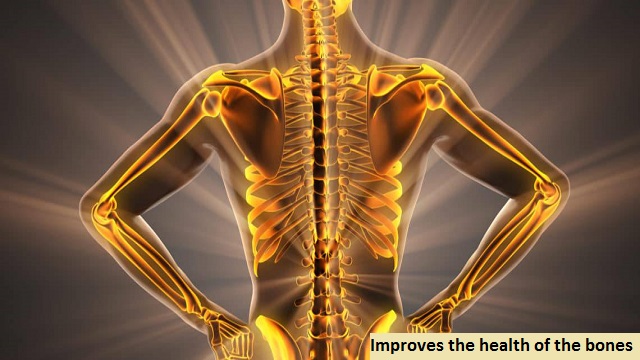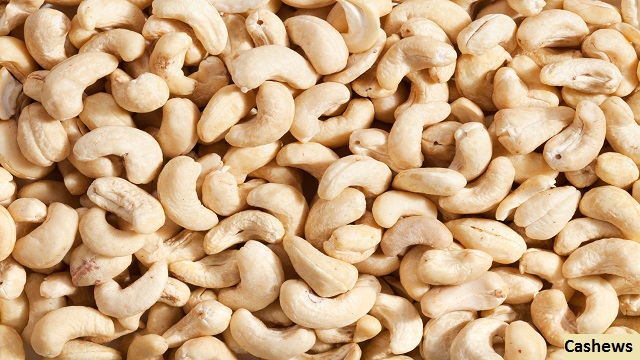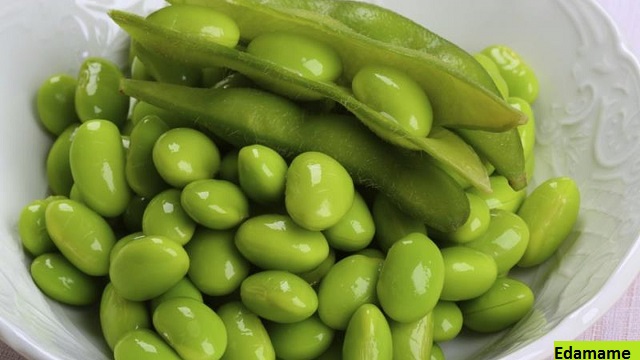
Twelve Foods High In Magnesium For Better Health And Wellness.
Magnesium is an important and necessary mineral that is involved in hundreds of enzymatic reactions in the human body. By boosting natural testosterone levels, boosting your immune system, and enhancing sleep, magnesium can help you maintain adequate and optimal health.
This is abundant in many foods, so if you follow a balanced nutrition plan, you should have no trouble meeting the 400 mg daily recommendation.
What Does Magnesium Do and What Is It?
This is a common mineral that is important for overall human health and is involved in over 300 biochemical processes. This is a crucial cofactor for many enzymatic processes, particularly those related to energy metabolism and the production of neurotransmitters.
According to studies, getting enough magnesium contributes to a wide range of health advantages, including the ability to reduce inflammation, boost immunity, ease constipation, enhance sleep, and lower blood pressure.
Benefits of magnesium:
Numerous health issues, such as hypertension, anxiety, cardiovascular disease, and diabetes, have been linked to this deficiency. For the best possible health and wellness, it’s crucial to consume enough foods high in this.
Lowers Blood Pressure:
A major contributor to heart attacks and strokes is high blood pressure. Regardless of BMI or weight, studies have shown that magnesium deficiency is inextricably linked to high blood pressure. There is evidence that treating this deficiencies can lower blood pressure.

Improves the health of the bones.
Your bones become more brittle and lose density as we age. Increased this intake has been shown to increase bone density by maintaining skeletal muscle mass, which protects against bone fragility and age-related diseases like sacropenia and osteoporosis.
For the best chance of preventing bone fragility and potential fractures, especially during high-impact sports or intense functional training programs, consume foods high in this or take a high-quality this supplement containing 100% of the daily recommended intake.
Enhances Sleep:
You may experience negative effects on your metabolic and cardiovascular systems in addition to how you feel, how productive you are, and how well you can process information. Your sleep plays a significant role in why you can’t lose weight despite eating well and regularly exercising.
The suprachiasmatic nucleus in the brain controls the sleep-wake cycle and coordinates the circadian rhythms in other body tissues.
According to studies, By this may help with insomnia symptoms, length of sleep, and sleep quality. You may experience negative effects on your overall quality of life if you don’t get enough sleep. My entire next day is essentially ruined if I don’t get a good night’s sleep with high-quality sleep.
Rich in magnesium foods.
1. seeds from a pumpkin.
168 mg in 1 oz. of serving size.
Despite their diminutive size, pumpkin seeds are the food with the highest magnesium content, containing 168 mg per ounce. You can get close to 40% of your daily recommended this intake by mixing a handful of pumpkin seeds into your yogurt, oatmeal, or cereal. Pumpkin seeds also contain antioxidants like carotenoids and vitamin E, which help to lessen inflammation and free radical damage.
2. Almonds.
1 oz, 80 mg, per serving.
Almonds are incredibly nutrient-dense and abundant in fiber, healthy fats, antioxidants, and minerals like this. Because certain fats are inaccessible to digestive enzymes, almonds have the unusual property that 10-15% of their calories are not fully absorbed. Similar to pumpkin seeds, almonds contain a ton of antioxidants, vitamin E, and 20 percent of the daily recommended amount of this.
3. Spinach.
Serving Size: 1/2 cup, 78 mg.
Spinach is related to beets and quinoa and is a member of the amaranth family. Vitamins, nutrients, antioxidants, and magnesium are abundant in spinach. Nearly 20% of your daily requirement is present in just one-half cup of spinach, or 78mg.

4. Cashews.
1 oz, 74 mg per serving.
Brazilian-native cashew trees are the source of cashews. Low in sugar, high in fiber, good fats, protein, and vital vitamins and minerals, cashews are also a good source of these nutrients. In addition to this, cashews are a great source of copper, which is crucial for the metabolism of energy and the development of the brain. They contain nearly 70% of the daily value.
5. Peanuts.
14 cup, 63 mg per serving.
This is abundant in peanuts, including peanut butter. In addition to being rich in necessary minerals, peanuts also contain a lot of good fats. Your favorite snacks are a delicious and simple way to increase your magnesium intake by simply adding a scoop of peanut butter to them.
6. Soymilk.
1 cup; 61 mg per serving.
A wonderful and healthy milk substitute is soymilk. Soymilk, which is made from soybeans and water, has about 80 calories, 7 grams of protein, and 4 grams of fat and carbohydrates per cup. In addition to being high in vital vitamins and minerals, soymilk is lactose and cholesterol free.
7. Beans, black.
Serving Size: 1/2 cup, 60 mg.
Black beans are a fantastic source of fiber, protein, folate, and magnesium, earning them the title of “superfood.”. One cup of black beans contains an impressive 15 grams of fiber, 15 grams of protein, and 30% of the daily recommended intake of this. One easy way to increase your intake of magnesium is to include some black beans in your weekly meal preparation or taco salad.

8.Edamame.
Serving Size: 1/2 cup, 50 mg.
The most protein-rich and potent bean on the planet is the edamame. Soy protein, tofu, miso, and tempeh are just a few of the foods that can be made from edamame. A cup of edamame has almost 20 grams of protein and, unlike most plant-based protein sources, contains all nine essential amino acids, making it a complete protein.
With significant amounts of folate, vitamin K1, manganese, and mg, edamame are also a fantastic source of important vitamins and minerals.
9. Avocado.
44 mg in 1 cup of serving size.
Avocados primarily contain healthy fats and fiber, unlike most fruit, which is largely composed of carbohydrates. Avocados contain a wide range of vital nutrients, including Mg, vitamin K, folate, vitamin C, and various b vitamins.
Studies indicate that people who consume avocados are much healthier than people who do not consume this fruit, which is an intriguing fact. Avocados are the ideal topping for salads, sandwiches, tacos, and smoothies.
10. Potato.
Serving Size: 3.15 oz, 43 mg.
Potatoes are a complex carbohydrate, which may or may not be a surprise. Due to their high starch content and widespread use in unhealthy foods like chips and fries, potatoes are a contentious food.
You might be surprised to learn that potatoes contain resistance starch, a type of starch that is not digested by the small intestine but is very good for nourishing gut health.
11. Rice.
Serving Size: 1/2 cup, 42 mg.
Rice must be special rice. White rice lacks the hull, the bran, and the germ, the grain’s nutrient-rich center, so it is devoid of fiber and nutrients.
Even though white rice is not harmful to your health, it differs significantly from brown rice in terms of nutrition. White rice only provides 2% of the daily recommended amount of Mg compared to brown rice’s 11%.
12. Yogurt.
8 oz, 42 mg per serving.
With a high concentration of vital vitamins and minerals, yogurt is one of the healthiest foods you can eat. Yogurt is a fantastic food for weight loss because it has few calories and a lot of protein. Healthy probiotics found in yogurt can significantly enhance immune and digestive function.
Consider taking a magnesium supplement.
If a doctor finds that you are lacking in Mg, magnesium supplements may be helpful. Try to get magnesium from your food if you don’t have any serious health issues, though.
“Food first” is Taylor’s motto. “If you consume too much magnesium in a dietary supplement, unpleasant side effects like cramping, nausea, and diarrhea could happen. ”
Here are some suggestions for increasing your intake of magnesium:
Taylor suggests eating to provide your body with the recommended amount of magnesium it needs.
- five portions a day of fruits and vegetables.
- 1 ounce or 1/4 cup of nuts or seeds daily.
- Legumes every day of the week in one serving (roughly 1/2 cup cooked).
- Meals containing the foods high in magnesium mentioned above are also simply healthy.
- These foods have numerous advantages besides just providing magnesium. A healthy diet should be built around them.
Taylor asserts that these foods provide more than just magnesium.”You’re also getting a ton of amazing nutrients, like vitamins, other minerals, and phytonutrients, that can help your body in a variety of ways.
Potential Risks and Interactions:
Abdominal cramping, nausea, and diarrhea are just a few health risks that can result from consuming too much magnesium.
Before taking high this supplements or combining them with specific medications, it is imperative to speak with a healthcare professional because they may interact with antibiotics, diuretics, and drugs that alter heart rhythm.
Risks to health associated with too much magnesium.
Your health can be harmed by consuming too much magnesium. Too much this consumption can cause cramps in the stomach, nausea, and diarrhea.
Magnesium in excess can upset the mineral balance that your body needs to function properly.
In order to avoid these negative side effects, it’s critical to stick to the recommended daily intake of magnesium.
Magnesium intake that is too high may interact with some medications and cause digestive problems.
It is always advisable to speak with your doctor before beginning a new supplement regimen, especially if you are already taking prescription drugs for other health issues.

Interactions with medications:
Be mindful that certain medications and this supplements may interact.
Consult your physician before beginning a this supplement regimen, especially if you take other medications or have underlying medical issues.
This is due to the possibility of interactions between medications and this supplements that could reduce their respective efficacy.
Additionally, before taking this supplements, people with kidney disease should consult a doctor.
As you discuss potential interactions with your healthcare provider, keep in mind that your health and safety should come first.
Read More: Muscle mass loss take
Leave a Reply